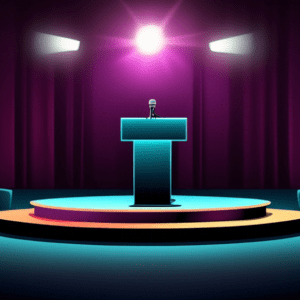A Gap in the Discourse: A Conspicuous Absence From the Recent Debate
Last night’s debate was a whirlwind of fiery exchanges, pointed rebuttals, and impassioned pleas. The candidates, vying for the coveted [Position] seat, tackled a range of pressing issues, from the economy and healthcare to education and climate change. Yet, amidst the cacophony of arguments and counter-arguments, a significant issue remained conspicuously absent – [The Issue].
The Elephant Not in the Room
While the debate raged on, the proverbial elephant in the room – [The Issue] – stood silently, its presence felt despite its lack of vocalization. This omission, though glaring, was, dare I say, a welcome relief. Not because [The Issue] is unimportant, but because its absence signified a potential shift in the political landscape, a subtle acknowledgment that perhaps, just perhaps, we are finally moving beyond the divisive rhetoric that has long plagued our discourse.
A History of Discord: [The Issue] in the Public Square
To understand the significance of this omission, we must first delve into the history of [The Issue] and its role in shaping public discourse. For far too long, [The Issue] has served as a political football, a weapon wielded by both sides of the aisle to score points and galvanize their base, often at the expense of meaningful dialogue and progress. The mere mention of [The Issue] has been enough to ignite fierce debates, fueled by misinformation, fear-mongering, and a blatant disregard for nuanced perspectives.
This weaponization of [The Issue] has had detrimental consequences, polarizing our society and hindering our ability to address the issue effectively. Instead of fostering understanding and finding common ground, the focus has remained on exploiting the issue for political gain, leaving a trail of broken promises and disillusioned citizens in its wake.
A Glimmer of Hope: The Potential for Progress
The conspicuous absence of [The Issue] from the recent debate, therefore, represents a potential turning point. It suggests a growing awareness among political hopefuls that resorting to the same old divisive tactics is no longer a viable strategy. Perhaps they are recognizing that the electorate is weary of the constant bickering and is yearning for leaders who prioritize pragmatism over partisanship.
This is not to say that [The Issue] is no longer relevant or worthy of discussion. On the contrary, it remains a pressing concern that demands our attention. However, by choosing to focus on other critical matters during the debate, the candidates implicitly acknowledged the need for a more constructive and less inflammatory approach to tackling [The Issue].
Moving Forward: Towards a More Nuanced Conversation
The challenge now lies in transforming this tacit understanding into tangible action. Moving forward, we need our leaders to engage with [The Issue] in a manner that fosters dialogue, promotes understanding, and seeks common ground. This requires a departure from the simplistic and often inaccurate narratives that have dominated the conversation for far too long.
Instead of resorting to fear and division, our leaders must engage with the complexities of [The Issue], acknowledging the diversity of perspectives and experiences that shape public opinion. They must prioritize evidence-based policymaking over politically expedient rhetoric, seeking solutions that address the root causes of the issue rather than simply offering band-aid solutions.
A Collective Responsibility: Engaging in Good Faith
The responsibility, however, does not lie solely with our elected officials. We, as citizens, must also hold ourselves accountable for fostering a more constructive and respectful dialogue. We must be willing to listen to perspectives that differ from our own, to engage with empathy and understanding, and to challenge misinformation and divisive rhetoric wherever we encounter it.
The absence of [The Issue] from the recent debate, while a welcome respite from the usual political maneuvering, should not be mistaken for a sign that the issue itself has vanished. Rather, it presents an opportunity, a chance to hit the reset button and engage with [The Issue] in a more thoughtful, nuanced, and ultimately, productive manner. Let us not let this opportunity pass us by.
